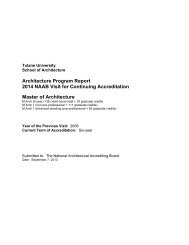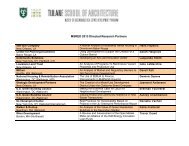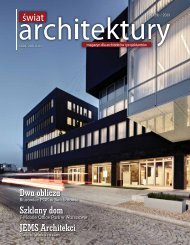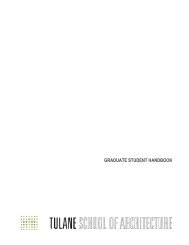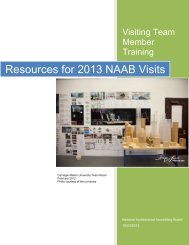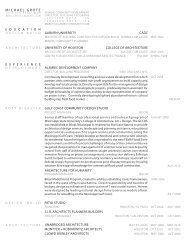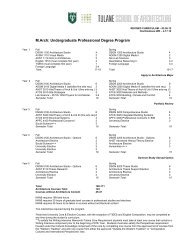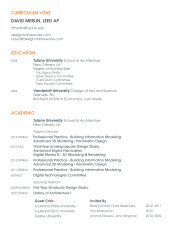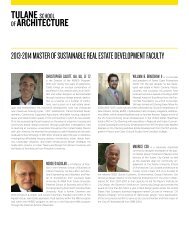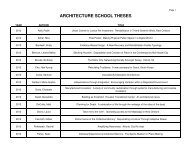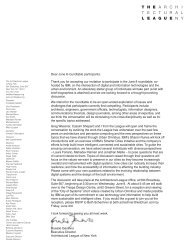Architecture Program Report Tulane University New Orleans ...
Architecture Program Report Tulane University New Orleans ...
Architecture Program Report Tulane University New Orleans ...
You also want an ePaper? Increase the reach of your titles
YUMPU automatically turns print PDFs into web optimized ePapers that Google loves.
110 during the year) focus intermittently on non-Western traditions. In<br />
addition, studio precedent research has broadened significantly to include<br />
non-Western traditions.<br />
With highly-developed backgrounds in Caribbean, Latin American and East<br />
Asian culture, several faculty (Professors Cizek, Gonzalez, Reese and<br />
Thomas) are deeply committed to architectural and cultural traditions that<br />
fall outside the Western tradition. This material is often presented in<br />
specific Platform Studios; in addition, faculty interested in these areas often<br />
teach within the required Design Studio sequence. However, Professors<br />
Gonzalez and Reese offer courses cross-listed with Latin American Studies<br />
(AHST 632 and AHST/RBST 691 respectively), both of which qualify for<br />
non-Western coursework. Dr. Robert Gonzalez also offers the elective<br />
course Representations of Culture and Ethnicity in the Public Sphere<br />
(AHST 632)<br />
As one of their requirements, students have to take at least one non-<br />
Western <strong>University</strong> elective. While this elective may not always pertain to<br />
the study of the arts and architecture, most university courses that do focus<br />
on non-Western subject matter contain a significant amount of material on<br />
culture, with an emphasis on the divergence of a particular culture from the<br />
traditions of the West.<br />
It should also be noted that two of the required courses in the Master in<br />
Preservation Studies/Certificate in Preservation Studies curriculum, History<br />
of the <strong>Architecture</strong> of the Americas I and II (PRST 661-01-01, PRST<br />
662-01-01), showcase the national and regional traditions and heritage.<br />
While not a required course, Professor Owen’s the professional concerns<br />
elective on “Ethics, Efficacy, and <strong>Architecture</strong> in the Globalized Economy<br />
(APFC 610), looks at the critique of Western traditions in light of<br />
burgeoning globalization and the reconfiguration of the socioeconomic and<br />
cultural maps of the West, as noted above.<br />
These opportunities are supplemented by several elective courses,<br />
including the Urban Design/Problems (RBST) courses, whereby students<br />
are introduced to non-Western formulas for urban design and development.<br />
Several of Professor Grover Mouton’s projects (RBST 341: Interpretive<br />
Urbanism) have been located in China. The <strong>University</strong>’s recognition of non-<br />
Western traditions is reflected also in course listings across campus,<br />
including courses and degree programs in Anthropology (Maya and Aztec<br />
Literature – ANTH 683), History of Art (Pre-Columbian Art – ARHS 370,<br />
Aztec Arts – ARHS 672), History (West African Culture and Society - HISB<br />
312, African American Religious History – HISU 344, Introduction to Latin<br />
American History – HISL 171, among others), Languages (Japanese,<br />
Chinese), Asian Studies, African and Diaspora Studies, Cultural Studies,<br />
and Latin American Studies (LAST 301, LAST 302).<br />
10. National and Regional Traditions<br />
Understanding of national traditions and the local regional heritage in<br />
architecture, landscape design and urban design, including the vernacular<br />
tradition.<br />
The understanding of the national traditions and the local regional heritage



